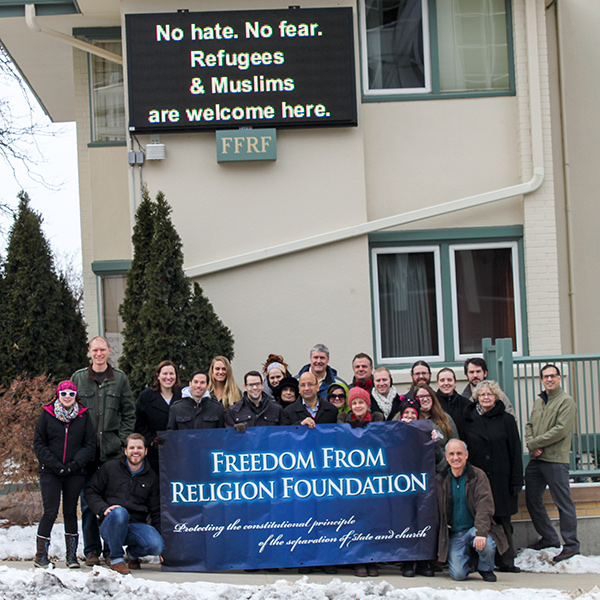
By Annie Laurie Gaylor and Dan Barker
Co-Presidents
Freedom From Religion Foundation
“Out of many, one.”
That’s the meaning of the Latin E Pluribus Unum, our nation’s original motto — chosen by a distinguished committee of Jefferson, Adams and Franklin. That sentiment is tarnished by President Trump’s executive order to bar Muslims from certain countries from entering the United States for at least 90 days, and halting Syrian refugees indefinitely.
The words of another American patriot, Thomas Paine (born Jan. 29, 1737), spring to mind: “My country is the world, to do good is my religion.” Paine famously vowed, “Wherever liberty is not, there is my country.”
Our nation, governed by a godless and entirely secular document, the U.S. Constitution, explicitly forbids any religious test for public office (Article 6, Section 3). The First Amendment of our Bill of Rights assures that we as a nation espouse no religion and enjoy freedom of religion. Under our Constitution, the U.S. government may not impose any religious test for citizenship or immigration.
As a civil liberties group working to buttress the Jeffersonian wall of separation between church and state, the Freedom From Religion Foundation denounces the executive order as unconstitutional and inhumane. Trump’s order offends the U.S. Constitution — and basic American values. (Trump notably left off his list Muslim-majority nations he and his company do business with.)
Chaos has already ensued at airports here and abroad, with the detention of a number of travelers. Plans years in the making to welcome and integrate a relatively tiny proportion of battle-scarred Syrian refugees have been ruined, and the status of Syrians already here has been imperiled, as has that of those visiting or with green cards from the seven blacklisted nations. Legal challenges against this violation of our Constitution and international law have been filed, and are already prevailing in federal courts. But the damage to international relations — and to up to 110,000 anguished individuals in line for resettlement and caught in the crossfire — cannot necessarily be undone.
Trump has disingenuously told reporters, “This is not a Muslim ban.” Yet as a candidate in December 2015, he called for an outright ban on admitting Muslims. Following criticism, he moderated that ban to say he would enact “extreme vetting.”
Trump’s executive order also suspended our nation’s program for admitting refugees from anywhere for 120 days while a new vetting process is created — but allowing for exceptions for persecuted religious minorities, such as Christians. This raises another set of constitutional concerns.
It also raises the interesting question of whether this means that the Trump administration would favor atheists from such nations, as well. Even under the Obama administration there was no asylum offered, for instance, for atheist Bangladeshi bloggers targeted for execution by ISIS. Will Trump offer support for courageous ex-Muslims who speak out as nonbelievers?
“President Trump has cloaked what is a discriminatory ban against nationals of Muslim countries under the banner of national security,” as Greg Chen of the American Immigration Lawyers Association told Reuters. Diligent screening to rationally prevent terrorists from entering our nation, which should be a given, isn’t the issue. (As widely noted, however, there appear to have been no fatal acts of terror within the United States waged by immigrants from the seven banned nations.) A ban on entry based on religion is the constitutional issue.
Historically, our founders, including Congress, went to great lengths to reassure the Muslim world that the United States was open to all-comers, of whatever or no religion. The Treaty of Tripoli, with a Muslim nation, was negotiated in 1796 during the presidency of George Washington, and ratified by Congress and signed by our second president, John Adams, in 1797. The portion relevant to today’s debate reads:
“As the government of the United States of America is not in any sense founded on the Christian religion — as it has in itself no character of enmity against the laws, religion or tranquility of Musselmen — and as the said states never have entered into any war or act of hostility against any Mohammedan nation, it is declared by the parties that no pretext arising from religious opinions shall ever interrupt the harmony existing between the two countries.”
Our new president needs to pay more attention to the wisdom contained within these words.

